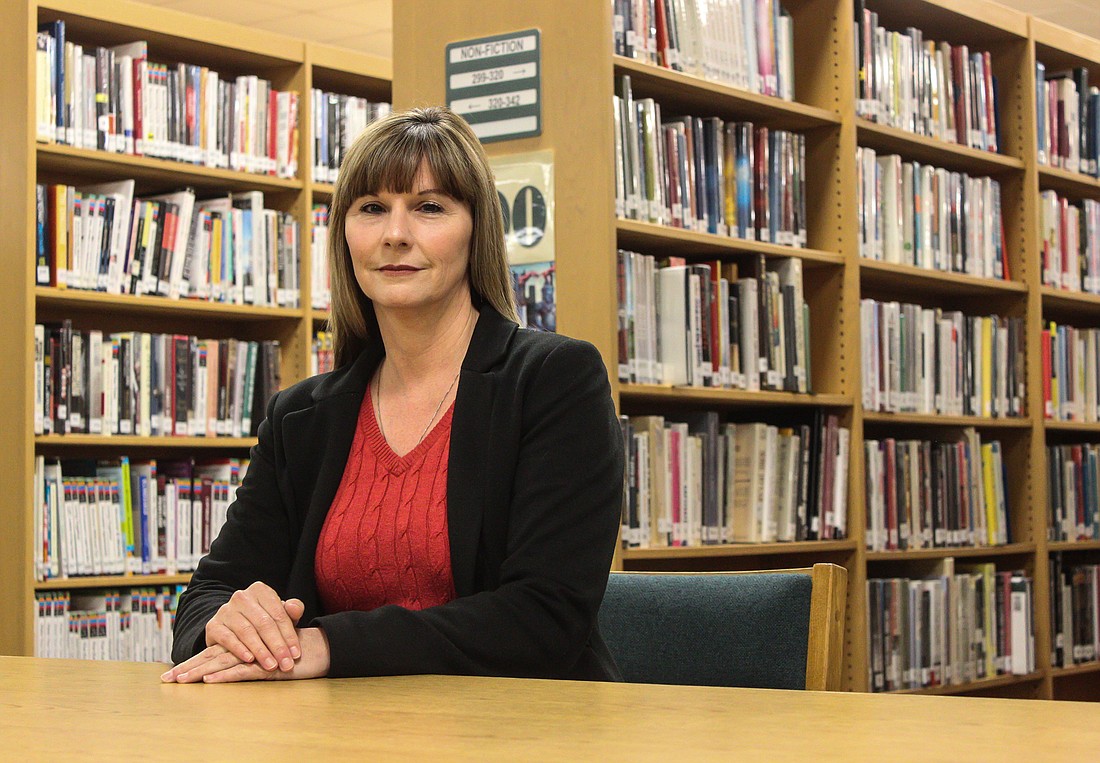- April 8, 2025
Your free article limit has been reached this month.
Subscribe now for unlimited digital access to our award-winning local news.

Holly Albanese has been the director of the Flagler County Public Library for the past 12 years.
She’s usually the first employee to arrive each day for work at the library’s main branch off Palm Coast Parkway. By 6:30 a.m., she makes her way through the parking lot to open the doors to the building. Almost every morning, several homeless people are propped up against the doors or walls, fast asleep.
The homeless population that inhabits the woods on the library’s 19-acre property has grown considerably in recent years. Two years ago, Albanese said there were only a couple of tents. The population of the camp has since swelled to as high as 40 individuals.
Albanese and her staff have found discarded needles and other drug paraphernalia. Albanese once found a small plastic bag of what was believed to be crack (which was promptly handed over to Flagler County deputies for disposal). Staff have scrubbed off human feces and blood from the floor and walls of the library’s bathrooms. They’ve broken up fights between the homeless. And they’ve called law enforcement and emergency medical technicians for help on multiple occasions.
Albanese and her staff have had enough.
The issue over what to do with the homeless at the library’s property has reached a boiling point in the community, and while county officials debate over the best course of action to take to resolve the problem, library staff felt left behind.
“None of them are on this property every day,” Albanese said. “We’re the ones dealing with this on a daily basis.”
The library’s staff do not feel safe working in that environment. They no longer use the employee parking lot on the west side of the building, which is near one of the trailheads to the camp. They fear walking to their cars at night.
“My staff had hope that this was going to be taken care off and that they could feel safe again. So they’re sort of putting the pressure on me to do something about it,” Albanese said. “And I’m not sure what the answer is because I’m not sure I feel as though we have a say in anything that happens here. I’m not getting a seat at the table. I’m not part of the conversation.”
***
Jacqueline Brown, who has been an assistant at the library for six years, isn’t sure how many fights she and the rest of the library staff have broken up — it seems like a weekly occurrence.
The fights usually originate in the west parking lot. Sometimes they occur at the front of or even inside the library. There hasn’t been a physical altercation between the homeless and library staff yet, but staff are worried that it’s a possibility.
“Policing it ourselves has been commonplace now, and it’s pulling ourselves away from being regular employees,” Brown said. “We shouldn’t be having to do this. We’re not trained in that department. We don’t want to see people get hurt.”
Jessica Robayo has worked at the library for three years. In addition to the fights, she’s seen homeless either intoxicated or high on drugs. She’s seen them pass out inside the library. And in mid-February, she witnessed a young homeless woman collapse due to a seizure and didn’t know what to do.
“I’m just a library assistant,” she said. “I’m not a medical professional.”
She added: “We’ve become desensitized to what’s happening here because everything has become normalized.”
***
The library staff hit peak frustration on the afternoon of Thursday, March 7. They met with Interim County Administrator Jerry Cameron and District 4 County Commissioner Joe Mullins to finally voice their displeasure.
As a result, Cameron ordered the deployment of armed security at the library to address the safety concerns. The county will have one armed guard from its current security contractor, Allied Universal Security Services, stationed at the library.
Mullins said he was going to pay for the security out-of-pocket for Friday, March 8, and Saturday, March 9, and the county was going to take over on Monday, March 11.
“This isn’t to tell the homeless that they can’t come in the library. I don’t support that at all,” Mullins said. “This is to help the library staff if they have a bad situation. They have someone here to make them feel safe and to enforce the rules.”
While the staff and the library's patrons might feel safer, many of them don’t believe the problem ends there.
“We will be able to focus on our jobs for once,” Robayo said. “We’ve been entrusted with kind of solving this issue when we haven’t even had a voice in it. ... It’s a Band-Aid solution."
Your free article limit has been reached this month.
Subscribe now for unlimited digital access to our award-winning local news.